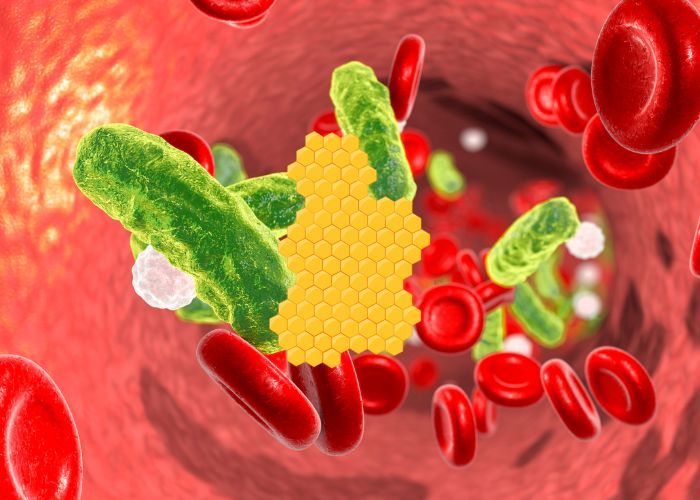Manuka honey originated in New Zealand and is a dark honey produced by bees that pollinate the flowers of the manuka bush. Manuka honey contains active compounds that give it natural antimicrobial properties and this is what sets it apart from ordinary honey. About the benefits of manuka honey we will share in this article on"mybiopedia.com".
When buying manuka honey, you should look for the UMFTM sign on the label. This stands for Unique Manuka Factor and is a quality trademark awarded to licensed beekeepers, producers and exporters of genuine manuka honey from New Zealand.
In addition to the UMFTM trademark, you will also see a number such as 10+ or 25+, which represents the level of the unique compounds methylglyoxal (MG) and dihydroxyacetone (DHA) contained in that particular honey. These compounds give the honey its purity and quality.
The higher the number, the higher the MG and DHA content and therefore the honey is considered to be purer and with more potent properties. There are numerous health benefits of consuming manuka honey and we will talk about five of the main ones in today's article.
Keep in mind, manuka honey is heat resistant, so it can be used in a number of recipes, but it can also be consumed on its own and with pleasure.
Manuka honey for fast wound healing
Manuka honey is probably best known for its properties to help wounds heal more quickly and successfully. When applied directly to a wound as a poultice or poultice, it can enhance the healing process and reduce pain.
Possessing complex antimicrobial, antioxidant, and anti-inflammatory effects, studies have shown that manuka honey supports wound healing, tissue regeneration, superficial burns with partial depth, diabetic ulcers, and eyelid wounds such as after surgery.

Manuka honey for gastrointestinal health
Manuka honey acts as a prebiotic as it is a source of indigestible carbohydrates known as oligosaccharides. We humans cannot process these carbohydrates, but the bacteria in our gut can. Using oligosaccharides as fuel supports the levels of "good" bacteria in our digestive system, including bifidobacteria and lactobacilli.

Research shows the potential of manuka honey to protect against stomach ulcers, providing an anti-inflammatory effect and potentially helping to tackle infections such as Helicobacter pylori, which can cause ulcers and acid reflux.
There is also some evidence that Manuka honey may help treat other intestinal infections, including those from bacterial strains such as Clostridium difficile.
Manuka honey against viruses
A 2014 study of manuka honey found that in laboratory conditions it effectively inhibited influenza viruses, and another study found that it had significant activity against herpes zoster.

However, more research, including human trials in the field, is needed before any firm conclusions can be drawn. Still, it is suggested that regular consumption of Manuka honey helps fight viruses and help our immune system function better and protect us.
Manuka honey for sore throats
Honey and lemon have been proven over the years to be an effective remedy for the common cold and studies support this claim.
A 2010 study found that honey was more effective for relieving coughs in children than over-the-counter cough suppressants.
Following the recent Covid-19 pandemic, multiple studies are now looking at the efficacy of Manuka honey in treating patients infected with the virus.

There is no doubt that the combination of Manuka honey and lemon can indeed support our health during a cold or viral illness.
Manuka honey in antibiotic resistant infections
A 2020 study investigating the use of medicinal honey as an approach to treating multi-drug resistant infections suggests that manuka honey should be considered as an alternative therapy.
More evidence suggesting that consuming manuka honey can help the body fight off a range of diseases and boost immunity more successfully than a number of conventional treatment drugs.

There are many claims about the miraculous abilities of manuka honey for our health.
Some have been proven over the years, while others are based on limited small-scale studies that, while promising, cannot be used to draw conclusions about its clinical use.
Always consult your GP or other health professional if you have concerns about whether manuka honey is right for you.
However, remember that this is a natural product and as such should not have side effects or pose other risks to your health.






Comments